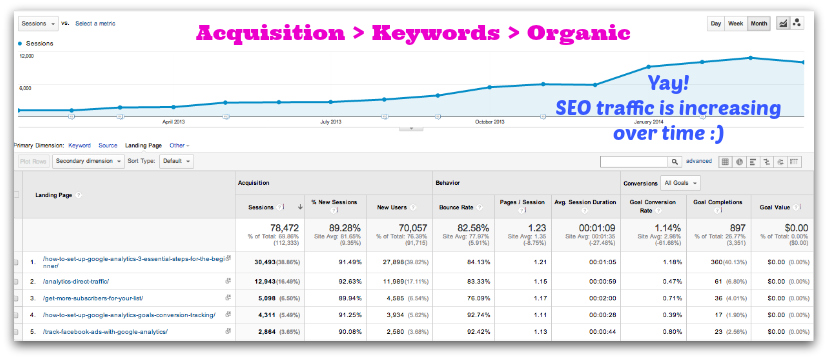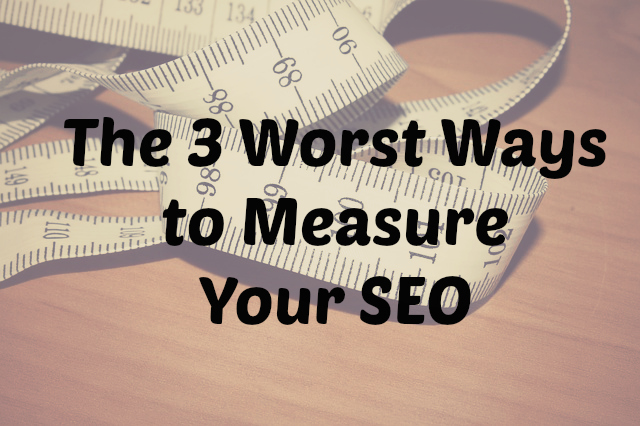When I first learned that SEO was a so-called proven method to get your site, blog posts, and pages to the top of Google's search ranking, I was overjoyed. Back in 2009 – I was learning how to create a niche site from Ed Dale of the then called Thirty Day Challenge.
I went on my merry way – defining my main keywords, loading posts with the words every chance I could get, doing things like bolding those keywords, submitting my articles to a place that would get me backlinks in a “natural way”…
I branched out and listed myself and pilates practice in every nook and cranny of Google…But I did such a random array of tactics that I felt like I was just throwing spaghetti at the wall to see what would stick.
Funny thing – the stuff that stuck was not the article listings or those backlinks or the article stuffing… actually to be totally truthful I have no idea “what stuck”.
Because I missed the “how to measure SEO” memo to help me figure out if all my work was working!
What I do know is this – 5 years after touch my blog about a specific pilates niche, I'm still getting traffic, still getting calls every single week (still) for people wanting to take pilates from me. Now I'm thinking I should find out why I'm still getting all that traffic and ranking.
So – today, I asked SEO expert Liz Lockard to lay the law down on the 3 worst ways to measure your SEO. You might be doing them, so read on.
[divider_short]
Ever try to do some SEO for your website?
You know, trying to make it show more in the Google results?
Maybe try to get your new blog post to that elusive first page?
How do you know if it’s working?
Do you ask your customers?
Google yourself?
Try to check your ranking with a fancy SEO tool?
No.
No.
No.
No.
If you’re trying to find out whether or not the SEO you’re doing for your biz is working – none of these ways are the way to do it.
Asking a customer if they found you on Google?
Maybe that’ll work – if the customer Googled their question, found you, and hired you on the spot.
But it mostly doesn’t work that way.
What happens more is a potential lead googles you, finds your website, if you’re lucky (and you’re working on growing your email list), they opt-in to hear more from you…. and maybe a few months down the line they hire you.
Do you think *that* customer is going to remember that they Googled you? Or what they Googled to find your originally?
I’m sorry, but the answer is almost certainly no.
And that’s okay.
What about googling yourself? Why doesn’t that work?
The big problem with googling yourself is that the Google you see isn’t the Google that everyone else sees.
Your search results (the answers Google spits back at you after you type in something in the search box) are highly tailored.
Being signed into Gmail or Google Plus, your search history, your physical location… all of these things affect what you see in the search results.
Not exactly an unbiased look at what’s working, is it?
Okay, so what about looking at my rankings?
There are a ton of tools out there that help you see where you rank in the search results overall for various phrases. Are you in the top 10 for “seattle bakery” or not even in the top 100?
I’m not even linking to them here because – and I know you see this one coming – rankings is the wrong SEO metric to focus on.
Why? Because you’re not after a good Google ranking – though it sounds nice.
What you’re really after is more of the right kind of traffic to your website?
Who cares if your average rank is #200 if you’re seeing heaps of ideal customers opting in to your site and buying your services from Google?
Not me. (and I hope not you either!)
So what to do instead?
Check out Google Analytics.
Google Analytics is a 100% free tool that helps you see what’s going on with the traffic to your website – where they’re coming from & what they’re doing. (New to it? I’ve got a quickstart guide for ya)
And if you head to the organic search section of your report, you can see exactly how much of your traffic is coming from Google (or Bing!) and whether that’s going up or down.

From here, you can find out if your actual traffic numbers from search engines is going up or down.
If you have goals setup, you can see whether this traffic is converting or not. No goals? Look at your bounce rate – is this traffic bouncing (aka leaving your site) less over time? Less than your other traffic? If so, all signs point to good job 🙂
If not, it’s time to dig a little deeper and readjust your SEO strategy.
Over to You
Have you tried any SEO for your site? How do you tell if it’s working or not? Ever use Google Analytics? Share with us in the comments!
[box_colored width=”85%” border=”0px” style=”solid” background=”azure” bordercolor=”#hex”]Stay tuned for Liz's latest upcoming training by making sure you're on her event notification list and get more SEO tips right here. [/box_colored]
[divider_short]
 Liz Lockard is an SEO and Google Analytics nut who loves helping small businesses get more of the right kind of traffic to their websites. She’s the creator of Your SEO Roadmap, a DIY SEO program all about taking the headache out of SEO and making getting loads more ideal client traffic easy peasy. Find out more here.
Liz Lockard is an SEO and Google Analytics nut who loves helping small businesses get more of the right kind of traffic to their websites. She’s the creator of Your SEO Roadmap, a DIY SEO program all about taking the headache out of SEO and making getting loads more ideal client traffic easy peasy. Find out more here.


Hi Anne, I’ve tried signing up for the webinar for May 22nd. The link does not bring up the sign up sheet. Does that mean its full or is the link broken? I tried from this page and from the email i received 3 hours ago. Thanks! Andrea
Andrea! Let me know if you are all set now. I know Kristina reached out to you. Can’t wait for tomorrow! -Anne